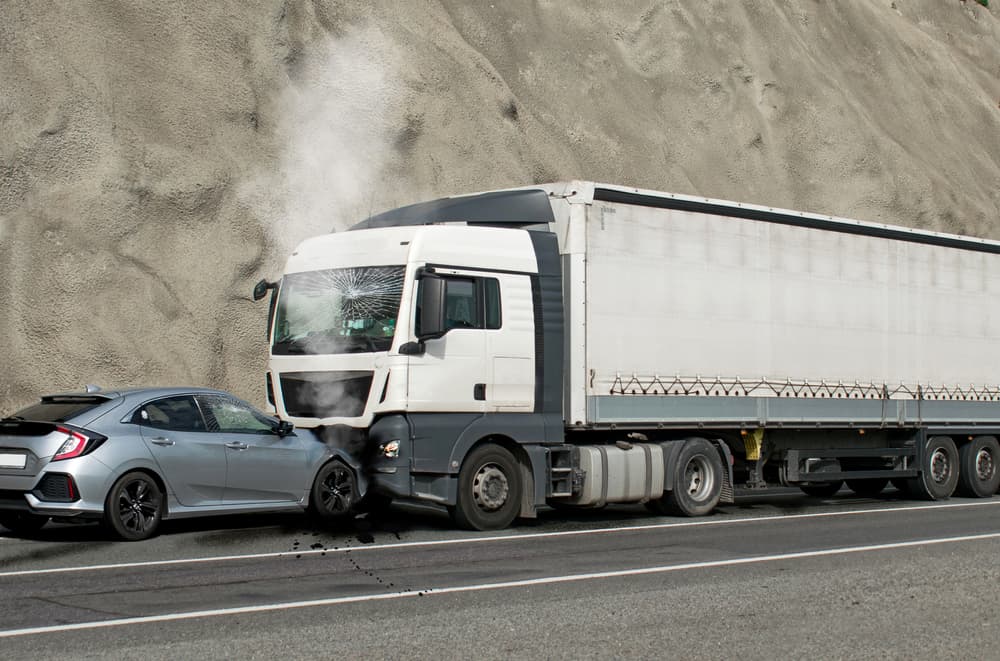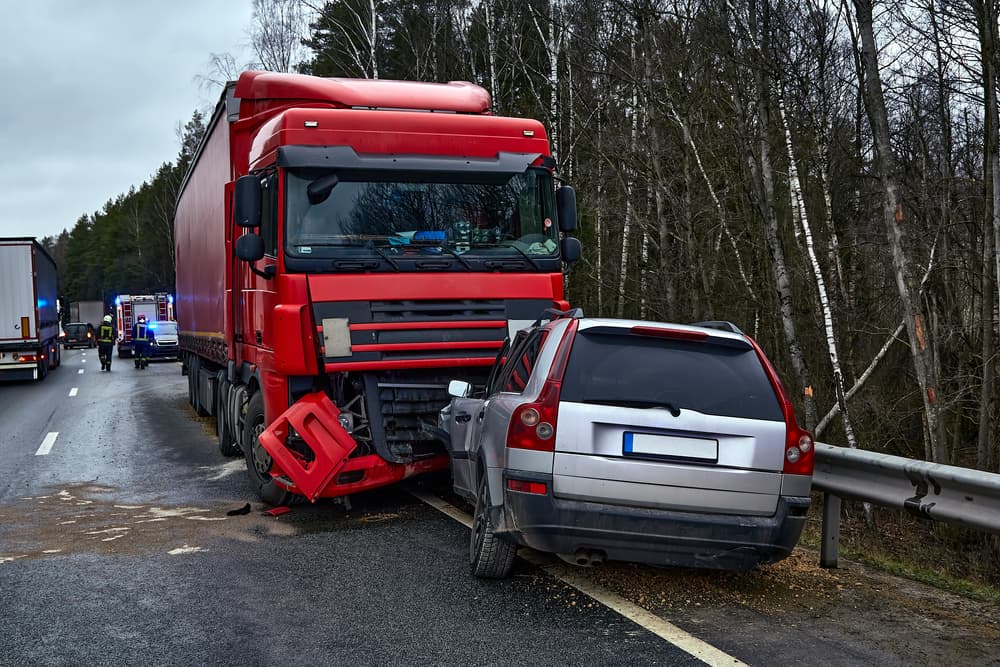In a head-on truck collision, the front of a large truck (such as a commercial truck or box truck) strikes the front of an oncoming vehicle. Due to the amount of force and vehicle speeds, these accidents are the most likely to cause permanent injuries and fatalities. If you recently suffered injuries in a head-on truck accident, you can file a personal injury claim with the at-fault truck driver or trucking company’s insurer. A knowledgeable Edmonton truck accident lawyer in your area can file the appropriate claim on your behalf, negotiate with insurance company representatives, and pursue the full monetary damages you need for the injuries you suffered in your accident.
GET YOUR FREE CONSULTATION NOW!
How Do Head-on Truck Crashes Commonly Occur?
Head-on truck accidents are often catastrophic events with severe consequences due to the size and weight of the trucks involved. Several factors contribute to these collisions, and understanding them is crucial for improving road safety.
Driver Fatigue — Long hours on the road can lead to driver fatigue, impairing reaction time and decision-making. Truck drivers, especially those working under tight schedules, may push themselves to the limit, increasing the likelihood of errors that result in head-on collisions.
Distracted Driving — Distractions, such as using mobile phones, adjusting radios, or even eating, divert a driver’s attention from the road. Truck drivers are not immune to these distractions, and when their focus wavers, the risk of a head-on collision rises significantly.

Speeding — Excessive speed is a common factor in many accidents, including head-on collisions involving trucks. High speeds reduce a driver’s ability to react promptly to unexpected situations and increase the impact force, making these accidents more severe.
Impaired Driving — Driving while under the influence of alcohol or drugs is a dangerous behaviour that affects a driver’s coordination and judgment. Impaired truck drivers pose a significant risk on the roads, increasing the likelihood of head-on collisions.
Poor Weather Conditions — Adverse weather conditions, such as heavy rain, snow, or fog, can reduce visibility and road traction. Trucks require longer stopping distances, and when combined with poor weather, the risk of losing control and causing a head-on collision becomes more substantial.
Mechanical Failures — Malfunctions in a truck’s critical systems, such as brakes or steering, can lead to accidents. Regular maintenance and thorough inspections are essential to identify and address potential issues before they contribute to a head-on collision.
Inadequate Training — Insufficient training for truck drivers can result in poor decision-making on the road. Proper training programs should emphasize defensive driving skills, awareness of blind spots, and the importance of maintaining a safe following distance to prevent head-on collisions.
Road Design — A poorly designed roads or inadequate signage can contribute to head-on collisions involving trucks. Narrow lanes, lack of proper signalling, or confusing intersections increase the risk of accidents, especially for large vehicles like trucks.
Reckless Overtaking — Improper overtaking maneuvers can lead to head-on collisions, especially on two-lane roads. Drivers attempting to pass other vehicles without clear visibility or misjudging the distance and speed of oncoming traffic contribute to these accidents.
Failure to Yield Right-of-way — Ignoring right-of-way rules at intersections or during lane merges can result in head-on collisions. Both truck drivers and other motorists must adhere to traffic regulations to prevent these accidents.
Addressing these common causes requires a multi-faceted approach, including improved driver training, stricter enforcement of regulations, enhanced vehicle maintenance standards, and continuous efforts to enhance road infrastructure and safety measures.
Who Can Be Liable for a Head-on Truck Accident?
Determining responsibility for a head-on truck accident involves comprehensively analyzing the factors leading to the collision. Responsibility may lie with one or multiple parties, and legal proceedings often consider various aspects.
Driver Negligence — The primary responsibility often falls on the driver’s actions. If a truck driver was speeding, driving under the influence, distracted, fatigued, or engaged in reckless behaviour, they can be accountable for the head-on collision. Negligence can encompass a range of actions or inactions that contribute to the accident.
Employer Liability — In cases where the truck driver is an employee, the employer may share responsibility. Employers must train their drivers adequately, comply with regulations, and maintain safe working conditions. The employer can be liable if the accident results from a failure in these areas.
Maintenance Issues — If mechanical failures or inadequate truck maintenance played a role in the accident, responsibility may extend to the trucking company or maintenance provider. Regular inspections and proper upkeep of the vehicle are essential to prevent accidents caused by mechanical issues.
Third-party Factors — Responsibility can also fall on third parties, such as manufacturers of faulty truck parts or entities responsible for road maintenance. Defective brakes, tires, or other components may contribute to an accident, making the manufacturers liable.
Governmental Entities — Poor road design, lack of proper signage, or inadequate maintenance by government agencies can also lead to a head-on truck accident. In such cases, the relevant authorities responsible for road infrastructure might share responsibility.
Other Drivers — In multi-vehicle accidents involving a head-on collision with a truck, other drivers on the road may share responsibility. If a driver failed to yield, made an unsafe lane change, or otherwise contributed to the collision, they can be held accountable.
Investigations, eyewitness testimonies, and expert analyses are crucial in determining responsibility. Legal proceedings, insurance companies, and regulatory bodies play essential roles in establishing accountability and ensuring that those responsible are liable for the consequences of a head-on truck accident.
What Are the Most Common Injuries for Truck Accident Victims?
Injuries sustained in truck accidents can be severe and life-altering due to the sheer size and weight of commercial trucks. Victims often experience a range of physical and psychological traumas, impacting their well-being and quality of life. These include the following:
- Whiplash and neck injuries
- Spinal cord injuries
- Traumatic brain injuries (TBIs)
- Fractures and broken bones
- Internal injuries
- Burn injuries
- Post-traumatic stress disorder (PTSD)
- Amputations
The road to recovery for truck accident victims often involves extensive medical treatments, rehabilitation, and ongoing care. Physical, emotional, and financial burdens can be overwhelming, underscoring the importance of legal recourse to secure compensation for lost income, pain and suffering, and the overall effects on the victim’s life.
How Do I Legally Prove a Truck Accident Claim or Lawsuit?
Proving legal liability in a head-on truck collision involves a thorough and systematic process to establish the responsible party or parties. Given the severity of these accidents, it is crucial to gather evidence demonstrating negligence or wrongful conduct. Here are key steps and considerations in legally proving a head-on truck collision:
Accident Investigation — Law enforcement and specialized accident investigators typically examine the scene immediately following the accident. They document the positions of vehicles, skid marks, and other physical evidence. Gathering this information helps reconstruct the sequence of events leading to the head-on collision.
Eyewitness Testimonies — Statements from individuals who witnessed the accident can provide valuable insights. Eyewitness testimonies can corroborate or challenge the accounts of involved parties and contribute to a clearer understanding of the events leading to the collision.
Electronic Data — Many commercial trucks have electronic data recorders (EDRs) or black boxes that capture critical information such as speed, braking patterns, and acceleration. Retrieving and analyzing this data can provide objective evidence of the truck’s movements before and during the collision.
Driver Statements —Statements from the drivers involved, including the truck driver, are essential. Police can record these statements at the scene or obtain them later during the investigation. Any admission of fault or inconsistent statements can be crucial in establishing liability.
Vehicle Maintenance Records — Inspection of the truck’s maintenance records is essential to determine if mechanical failures or defects played a role in the collision. Poorly maintained brakes, tires, or other crucial components can indicate negligence by the trucking company or maintenance provider.
Traffic Violations — Traffic violations, such as speeding, reckless driving, or failure to yield the right-of-way, can contribute to establishing fault. Citations issued to the truck driver or other involved parties can prove negligent behaviour.
Medical Records — Documentation of injuries sustained by all parties involved is crucial for establishing the severity of the collision. Medical records, including diagnoses, treatment plans, and prognosis, help link the injuries directly to the accident.
Expert Witnesses — Expert witnesses, such as accident reconstruction specialists or medical professionals, can provide unbiased opinions based on their expertise. Their testimony can lend credibility to your case by offering insights into the mechanics of the collision or the extent of injuries.
Surveillance Footage — Surveillance cameras near the accident scene can provide visual evidence of the collision. Obtaining footage from nearby businesses or traffic cameras can offer a clearer picture of what transpired.
Chain-of-custody Evidence — Proper documentation of the chain of custody for all evidence is critical to ensuring its admissibility in court. This includes maintaining a record of how anyone collected, stored, and handled evidence to prevent tampering or contamination.
Successfully proving legal liability in a head-on truck collision often requires a combination of these factors. A skilled legal team can help navigate the complexities of gathering and presenting this evidence in court to build a compelling case for compensation and justice.
What Monetary Damages Can I Recover in a Truck Accident Case?

Recoverable financial damages in head-on truck accidents can encompass a broad range of costs incurred by the victims due to the collision. These damages are recoverable through legal avenues to compensate for the accident’s economic effects on the injured party. Key recoverable financial damages in head-on truck accidents include:
Lost Wages and Income — When injuries prevent victims from working, they can seek compensation for lost income. This includes not only the immediate impact on earnings but also potential future income losses if the injuries result in long-term disabilities or impairments.
Property Damage — Damage to the victim’s vehicle and personal property is a recoverable financial loss. This covers the costs of repairing or replacing the damaged vehicle and any personal belongings lost or damaged in the collision.
Home Modifications — In cases where injuries result in long-term disabilities, victims may require modifications to their homes to enhance accessibility. The cost of home modifications, such as ramps or bathroom adjustments, can be recoverable damages.
Pain and Suffering — Non-economic damages, such as pain and suffering, may also be recoverable. While not directly tied to financial costs, compensation for the physical and emotional distress endured as a result of the accident is a crucial aspect of seeking justice.
Loss of Consortium — In some cases, spouses or family members may seek compensation for the loss of companionship, support, and intimacy resulting from the victim’s injuries or death in a head-on truck accident.
Funeral Expenses — In the tragic event of a fatality, recoverable damages include funeral and burial expenses. The financial burden placed on the family due to the untimely death of a loved one can be a part of the compensation a family receives.
Recovering financial damages in head-on truck accidents requires a comprehensive understanding of the specific losses incurred by the victim. Seeking legal counsel is essential to navigate the complexities of the legal process and pursue fair and just compensation for the economic impact of the accident.
Speak with a Truck Accident Lawyer Right Away

Effectively settling or litigating a head-on truck accident case alone can be extremely challenging. This is because insurance companies do not have your best interests at heart. Rather, they are only concerned about settling your case for as little money as possible, allowing them to keep as much of their own money in-house as possible.
By having experienced and compassionate legal counsel on your side, you significantly increase your chances of recovering the monetary damages you need and deserve. While you focus on recovering from your injuries, your lawyer can handle every step of the legal process for you, from aggressively negotiating with insurance company representatives to effectively litigating your case at a civil jury trial or alternative dispute resolution (ADR) proceeding.
Never wait to seek your free consultation with a Edmonton personal injury lawyer near you. Doing so costs you nothing and can give you peace of mind regarding the future. Protect yourself today.
